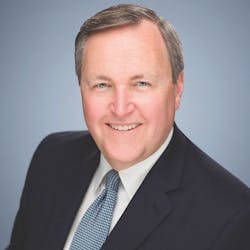Industry Insight: Plumbing Priorities
With a new administration in leadership in Washington D.C., the different facets of the water industry are advocating to ensure the administration’s priorities in water remain top-of-mind. One such impacted facet is the plumbing industry. Surrounding World Plumbing Day (March 11), WQP Managing Editor Lauren Del Ciello spoke with Kerry Stackpole, CEO and executive director for Plumbing Manufacturers International (PMI), on PMI legislative priorities and what he hopes to see progress on, including issues such as WaterSense, infrastructure investment, tariffs and more.
Lauren Del Ciello: Tell me what PMI priorities are you hoping may see progress under this administration?
Kerry Stackpole: One of the areas that we love and have great enthusiasm for is WaterSense, where PMI members have just jumped in the pool. There’s more than 33,000 different kinds of WaterSense labeled products. There are builders who build houses using exclusively WaterSense fixtures and fittings, so that’s a very important program from our standpoint. We’re hoping that the Biden administration sees the wisdom of keeping that program alive and well-funded.
There’s some other areas. [Workforce development is] a pretty vital area, not only for manufacturers. I think collectively there’s something north of 400,000 open jobs in the manufacturing space right now, but it’s also very important for the men and women who install our products. The average age of a plumber in America now is about 58 and there’s not a huge crowd coming up behind those folks to take these jobs. From our standpoint, we want to make sure our products are properly installed and working, and plumbers are the ones making that happen. From our standpoint, making sure there’s a good pipeline for apprenticeship and training programs that can get people in the workforce is really a vital activity. That, of course, assumes that the infrastructure is in place to provide clean water.
Del Ciello: How do tariffs impact plumbing manufacturers and how is PMI working with policy makers on these issues?
Stackpole: Part of the challenge is that we’re waiting for the U.S. trade representative (USTR) to be formally approved from the Senate. We’re going to be reaching out to the USTR to ask them to take a look at these existing tariffs and make sure that there’s not any excitement about a potential for adding new tariffs.
I think our members have been challenged by that. As an association, we keep them informed and we update on what’s happening. We have always opposed the imposition of tariffs because we just think it is the wrong solution. But now that we have them, the Biden administration is going to need to take some time to have a look at this, and frankly, I think the current administration will probably use those tariffs as a bit of a leverage with the Chinese to address some other issues in order to lift the tariffs. I’m hopeful that there’s a broader perspective on what needs to be done here. This is one of those things where time will tell. We don’t really know where it’s going, but we’re optimistic.
Del Ciello: Any advice to water professionals looking to stay informed on these issues and make their voices heard?
Stackpole: There’s this old saying in politics, which is that, ‘If you’re not at the table, you’re likely on the menu.’ I think that for water professionals, the trick is to be engaged ... If you’re a water professional and you’re interested in these issues, you need to communicate that to your elected leaders. You need to partner with your industry associations and engage with your associations that represent your interests and make sure that what you’re concerned about can be expressed to legislatures and regulators.
We operate in this kind of weird world now. We were talking about changes from the past year; well you can’t visit the capitol as a lobbyist, and as a citizen, you’d have a hard time getting to the capitol now. So there’s a different methodology that we’re using for advocacy, but I think one of the strengths for that different approach is to have many voices. The more voices water professionals can bring to the table, the better. We’ve all taken clean and plentiful water for granted for a long time — at least, I should say I know I have — but increasingly we see the impact of the pressure on water and on the demands of water systems and the need for infrastructure improvement and development of new resources for communities that are particularly arid. We really do need to do something about the old water infrastructure that we have. I think that is a place where Congress on a bipartisan basis can really get engaged.
*Responses have been edited for clarity and length. Listen to the full conversation from the Checking In series at bit.ly/checkingin36.
